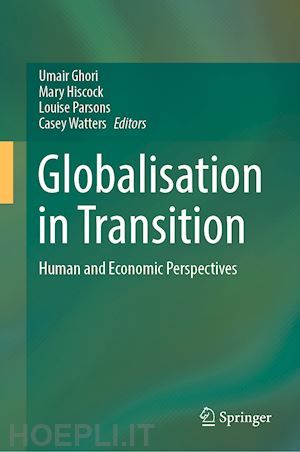
Questo prodotto usufruisce delle SPEDIZIONI GRATIS
selezionando l'opzione Corriere Veloce in fase di ordine.
Pagabile anche con Carta della cultura giovani e del merito, 18App Bonus Cultura e Carta del Docente
This book brings together diverse ideas on selected facets of globalisation and transitions in globalisation. The scholars that have contributed to this book examine the phenomenon of globalisation through varied lenses, focusing specifically on the human and economic perspectives. These analyses originate in many areas and different legal systems but are all connected through the work of Professor John Farrar and the associations of the contributors with him.
This book does not attempt to provide answers to the many challenges of globalisation. Instead, this book discusses selected, particular aspects of globalisation that derive from and are connected to the authors’ own research. The thematic diversity of this book is a true strength and should draw a broad range of readers. Whilst this book is primarily written from a legal angle, its content overlaps with broader specialised policy areas, with contributions ranging from taxation to ageing, from insolvency to social licences, and from refugees to the treatment of first nations people. In short, there is something for everyone in this book.
As a tribute to the life’s work of an outstanding legal scholar, Professor John Farrar, this book explores legal responses to the social and economic impacts of globalisation. After personal acknowledgments from colleagues highlighting the significance of his scholarship, this book is divided into two parts. The first part addresses the social impact of globalisation, focusing on immigration and the impact on First Nations people. Changes in the regulation of medicine and technologies related to ageing are also addressed in this part. In part two, the book addresses the transitioning corporate law landscape and notions of fairness and good faith in the law. The final part contains the conclusions, reflections and synthesis of the editors.
Dr Umair Ghori (LLB (Hons), LLM, PhD) is Associate Professor at the Faculty of Law, Bond University, with a background in corporate law practice. He researches in the field of international trade, business and investment law with a focus on exploring regulatory issues from a policy perspective and from the perspective of developing countries. Dr Ghori’s work has been published in well-regarded journals and edited volumes in Australia, Asia and the UK. His monograph, Global Textiles and Clothing Trade (Kluwer Law International, 2012), is the leading text examining international trade policy in textiles and clothing trade. Dr Ghori’s current research explores the use of export controls and its overlaps with various aspects of international economic law such as indirect expropriation and the role of social licences to operate. In addition to research, Dr Ghori teaches Contract Law and International Trade and Business Law at Bond University and acts as Academic Supervisor in the Bond Law Clinic. He is the recipient of the Stanley Shaw Prize for Teaching Excellence and has also served as Editor of the Bond Law Review from 2014 to 2018.
Prof Mary Hiscock AM is now Emeritus Professor in the Faculty of Law at Bond University, after many years teaching at Bond University and at the University of Melbourne, interspersed with visiting appointments in Europe, Asia and North America. Her fields are contract and international commercial and comparative laws. Professor Hiscock has represented Australia on a number of occasions at the United Nations Commission on International Trade Law (UNCITRAL). She was for many years Expert Adviser to the European Bank for Reconstruction and Development and Consultant to the Asian Development Bank. She continues to be Member of the Editorial Boards of the Australian Journal of Asian Law and of the Melbourne Journal of International Law. She is immediate past Chair of the International Law Section of the Law Council of Australia and past President of the Academy of Commercial and Consumer Law. She has published extensively over 50 years in books and periodicals, including with Springer.
Dr Louise Parsons is an Associate Professor and Associate Dean (Student Affairs and Service Quality) at Bond University Faculty of Law. She was Senior Legal Counsel in the South African Reserve Bank for 11 years, heading the Corporate, Commercial and Employment Law section, before joining Bond University. Building on her experience as in-house counsel for the South African Reserve Bank, Dr Parsons wrote her PhD thesis on the financial stability mandate of the Reserve Bank of Australia. She teaches and researches mostly in the area of banking and finance law with a particular interest in central banking and cryptocurrencies and blockchain technology. She has also published in the fields of civil remedies and legal education. Dr. Parsons received a Citation from the National Office of Learning and Teaching (Australia) and several other teaching awards. Dr Parsons has served as the chair of the Academic Committee of the Banking and Financial Services Law Association for two years.
Dr Casey Watters joined the Faculty of Law at Bond University in 2020 after previously holding positions with the University of Nottingham and Singapore Management University. Casey’s research focus is corporate law and insolvency where he has published on corporate insolvency, personal bankruptcy, cross-border insolvency, mergers and acquisitions and piercing the corporate veil. Much of his research is comparative and examines the challenges in protecting the rights of debtors and creditors when enterprises are present in multiple jurisdictions and where legal regimes may provide inconsistent rights and obligations.











Il sito utilizza cookie ed altri strumenti di tracciamento che raccolgono informazioni dal dispositivo dell’utente. Oltre ai cookie tecnici ed analitici aggregati, strettamente necessari per il funzionamento di questo sito web, previo consenso dell’utente possono essere installati cookie di profilazione e marketing e cookie dei social media. Cliccando su “Accetto tutti i cookie” saranno attivate tutte le categorie di cookie. Per accettare solo deterninate categorie di cookie, cliccare invece su “Impostazioni cookie”. Chiudendo il banner o continuando a navigare saranno installati solo cookie tecnici. Per maggiori dettagli, consultare la Cookie Policy.